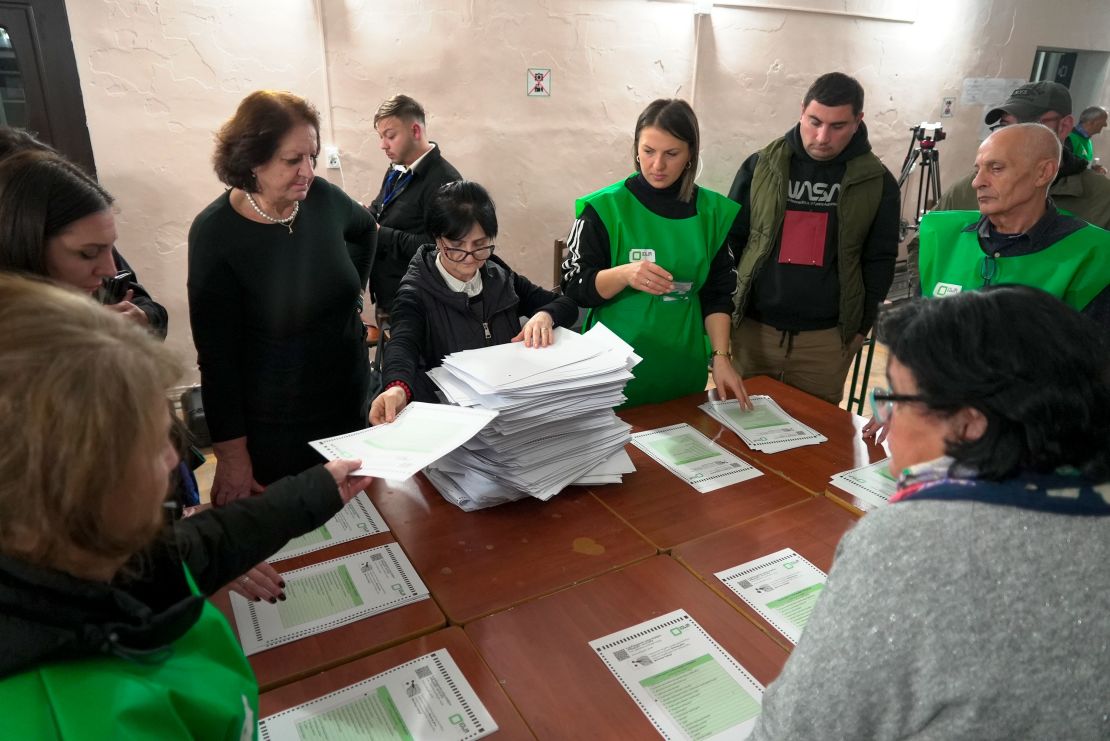Georgia’s pro-Western opposition parties have refused to accept results showing victory for the increasingly authoritarian ruling party, after a crucial parliamentary election seen as a choice between a future with Europe or closer ties with Russia.
The Georgian Dream (GD) party, founded by the reclusive billionaire Bidzina Ivanishvili, secured just under 54% of the vote, according to near-complete data from the Central Election Commission (CEC).
The main opposition parties, the Coalition for Change and the United National Movement (UNM) – founded by the jailed former president Mikheil Saakashvili – received 11% and 10% of the vote, respectively. Both have disputed the results and called for protests.
If confirmed, GD’s reelection could halt Georgia’s progress toward eventual membership of the European Union and see the former Soviet state slip back into the Kremlin’s orbit.
Ivanishvili, claimed victory swiftly after polls closed on Saturday. “It is a rare case in the world that the same party achieves such success in such a difficult situation,” he said outside the GD headquarters in Tbilisi.
Georgia’s splintered opposition parties have cried foul. “The elections were stolen, this is a coup and the GD is responsible for it and they will be held accountable,” Nika Gvamaria, one of the leaders of the Coalition for Change, said late Saturday.
Tina Bokuchava, head of the UNM, said her party does not accept the “falsified” election results. She said GD was attempting to “steal the European future of this country.”

Before the vote, observers had warned that GD – which came to power in 2012 as a center-left party but has in recent years taken a sharp authoritarian turn – would resort to anything to stay in power.
The election was marred by scenes of violence and disorder at polling stations across the country. A spokesperson for the CEC told CNN it has received 445 district-level complaints of irregularities.
President Salome Zourabichvili, a pro-Western figure whose powers are largely ceremonial, said groups had descended on polling stations “with the sole purpose of provoking conflict and confrontation.”
In one video from the southern city of Marneuli, a man was seen stuffing dozens of voting cards into a ballot box. Another video showed Azad Karimov – head of the opposition UNM’s regional organization – being assaulted by several men outside the polling station.
Levan Khabeishvili, who stood down as head of the UNM earlier this year after being assaulted by police during anti-government protests, said the opposition “could not believe” the results published by the CEC, since polls before the election showed only around a third of the public supported GD.
“There is not a single institution in Georgia that is not directly controlled by Bidzina Ivanishvili at this point,” Khabeishvili told CNN.
Official election observers have also expressed concerns about Saturday’s vote. The Parliamentary Assembly of the Council of Europe (PACE), a monitoring group, said its election observers had noted “cases of vote buying and double voting, before and during elections, especially in rural areas.”
Speaking at a press conference in Tbilisi on Sunday, Iulian Bulai, the head of PACE’s delegation in Georgia, said the use of cameras in many polling stations “led to a widespread climate of pressure and party-organized intimidation and the feeling that Big Brother is watching you.”
The first exit polls showed vastly different results. A poll conducted by Edison Research showed GD receiving 40.9% of the vote, while a poll by the pro-government Imedi TV station showed GD had won 56%.
Before the CEC published preliminary results, Hungarian Prime Minister Viktor Orban congratulated GD on its “overwhelming victory.” Critics have alleged that GD has increasingly modeled itself on Orban, Europe’s longest-serving leader. Speaking at the Conservative Political Action Conference (CPAC) in Budapest this year, Georgia’s Prime Minister Irakli Kobakhidze praised Orban as a “role model.”

Fragmented opposition
Polls routinely show that more than 80% of Georgians support joining the European Union. Although Georgia was given candidate status in 2023, Brussels froze its application process earlier this year after GD passed a divisive “foreign agents” law that critics say is modeled on similar legislation passed by Russian President Vladimir Putin designed to shut down watchdogs who call the government to account.
Although GD officially remains committed to eventual EU membership, its increasingly autocratic streak has isolated the Caucasus nation from its Western allies and pushed it closer towards illiberal regimes like Russia.
GD had campaigned on keeping Georgia out of the war in Ukraine. Before the vote, campaign billboards had contrasted thriving Georgian cities with Ukrainian ones reduced to rubble.
Ketevan Chachava, a fellow at the Center for European Policy Analysis, said this message, aiming to stoke “fear,” had been particularly effective in rural areas. “GD won in the regions; they lost the big cities,” she told CNN.
During the campaign, Ivanishvili had claimed the opposition belonged to a “Global War Party” bent on dragging Georgia into conflict with Russia, and has threatened to arrest his rivals and outlaw the UNM if his party is reelected.
The response to the exit polls has so far been muted. Although hundreds of thousands of Georgians had protested against the foreign agents bill earlier this year, the streets of Tbilisi were relatively quiet on Saturday.





